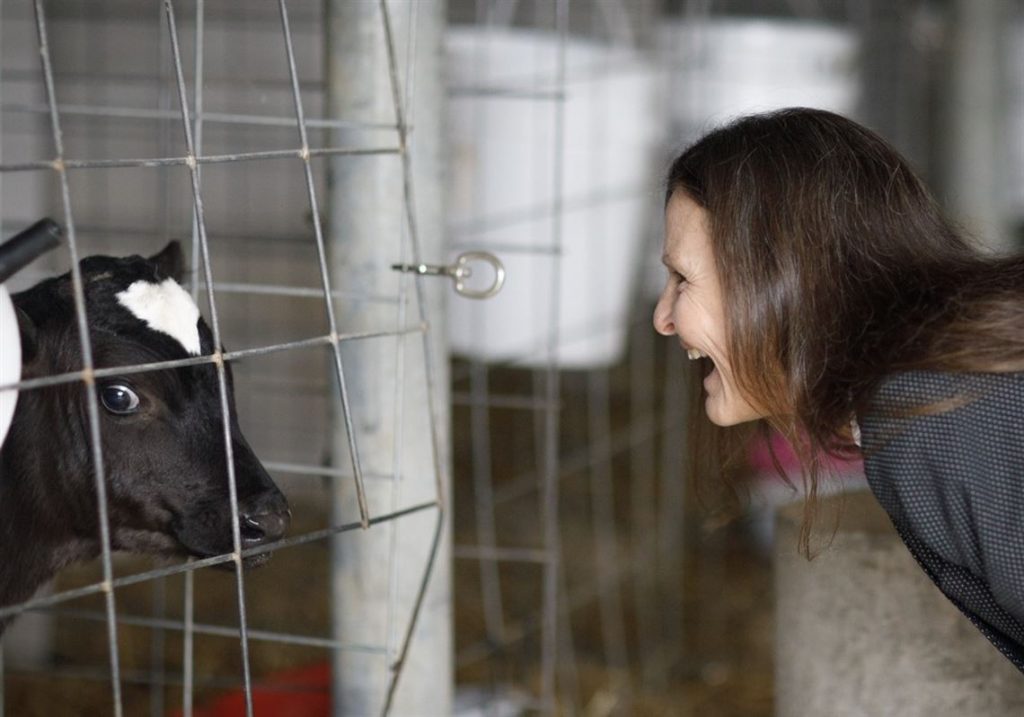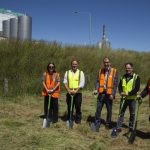
On a recent afternoon, Kristina Quinn stood squinting in the center of a cattle pen. It was hard to make out the fuzzy, gray dots on the ultrasound screen in front of her, but she was certain: There were two of them.
The 18-year-old gasped and called for her boss. It’s not every day you realize a cow is pregnant with twin calves.
“I still find it insanely cool,” said Ms. Quinn, an apprentice at a Berks County dairy farm who learned how to perform an ultrasound on a cow in the past six months. “It was pretty much as early as I could have seen it.”
Ms. Quinn is one of the first participants in Pennsylvania’s Dairy Herd Manager Apprenticeship program — a first-of-its-kind effort to develop the next generation of dairy farm workers.
The program, started in 2023, places applicants on farms across the state — primarily smaller, family-run businesses — for 18-month training stints to become dairy herd managers. The position involves oversight of a farm’s whole cattle herd, which can include hundreds of cows.
Apprentices, who must be at least 18 and have a high school diplomas or GED, complete at least 3,000 hours of paid, on-site training and receive technical instruction off the farm. They earn a minimum starting wage of $11 per hour, progressing over the course of the program and ending at $16 per hour.
The U.S. Department of Labor estimates that, on average, apprentices earn a starting wage of $80,000 per year after graduation and are on track to earn $300,000 more over their careers compared to workers who do not graduate from an apprenticeship program.
The new initiative is headed by Pennsylvania’s Center for Dairy Excellence, a partially-state funded organization created in 2004 as a task force of Pennsylvania’s Department of Agriculture to support dairy producers. Over three years, the center worked with dairy farmers statewide to develop the program and get it registered with the state’s Apprenticeship and Training Office in April 2023.
Months later, the center also registered a pre-apprenticeship that preps high school juniors and seniors for the full-time program. This summer, after completing that sequence and graduating from high school, the first two full-time apprentices — including Ms. Quinn — got started on Pennsylvania dairy farms.
Eleven students are currently enrolled in the pre-apprenticeship program, thanks to outreach efforts at schools and career development centers, said Michelle Shearer, workforce development director of the Dairy Excellence Foundation, a nonprofit created to support the work of the Center for Dairy Excellence.
Agriculture is one of Pennsylvania’s biggest industries, and the state’s 4,940 dairy farms — the second largest number in the nation — are a huge revenue stream, per the state’s Department of Labor and Industry. Pennsylvania’s dairy sector contributes $11.8 billion to Pennsylvania’s economy annually, according to the Center for Dairy Excellence. That’s more than two times the estimated valuation of the whole Steelers franchise. The sector also provides more than 47,000 jobs a year.
Still, dairy farmers face major hurdles, including labor shortages and high production costs. The apprenticeship program — part of a broader trend of increased state investment in workforce development and agriculture — targets small businesses’ pain points, Ms. Shearer said.
“[We] really felt that there was this need for skilled labor in the dairy industry, especially in middle management — dairy herd managers,” Ms. Shearer said.
‘You don’t really know until you’re doing it’
Less than six months into her apprenticeship, a cow’s back leg gave out while Ms. Quinn was on the job. She had to think fast: the 3-year-old animal could not stand on its own, and other cows were stepping on her.
With the help of other employees, Ms. Quinn successfully loaded the cow onto a vehicle and moved her to a safer location.
“Animal husbandry is what it’s called — being able to move cows and get them to do what you want, without them freaking out or being stressed,” she explained. “That’s definitely not something that can be learned in a classroom.”
Ms. Quinn, who grew up working on a few farms alongside her parents, started helping out at Zahncroft Dairy in Berks County over four years ago as a freshman in high school.
By the start of her senior year, Ms. Quinn was unsure about attending college. That’s when her boss at the farm, Katie Sattazahn, operator of the third-generation family-run farm, introduced the new apprenticeship program.
At a recent event on the farm, posters advertising the program explained that a dairy herd manager requires experience beyond high school — but not necessarily a college degree. The program’s emphasis on experiential learning pushed Ms. Quinn to apply.
“I can learn through books all day long, but you don’t really know until you’re doing it,” she said. “It’s helped me gain confidence in being able to learn new skills and do it by myself, without needing someone there.”
A typical day at Zahncroft Dairy starts at 3 a.m. with preparation for the first milking of cows before dawn. Ms. Quinn comes in several hours later, ahead of the second milking at noon.
After bringing the cows to the milking parlor, Ms. Quinn’s daily responsibilities vary: she might be tasked with breeding, inseminating cows in lieu of a male cow. She could do ultrasounds on pregnant cows, or monitor the health of baby calves. She also feeds and vaccinates cattle, and after an afternoon break, returns to the farm to oversee the evening milking.
The apprenticeship requires the mastery of 11 competency groups, and most concern handling cattle.
But Ms. Quinn has also gained employee management experience and learned about the farm’s finances. She can operate skid loaders and tractors, and test the quality of milk. Over the program’s duration, she’ll also develop her Spanish-speaking skills.
Since she started in late June, Ms. Quinn said, her pregnancy percentage — or, the success of cattle breeding efforts — has increased significantly.
The apprenticeship also includes 216 hours of unpaid training off the farm, ranging from two days of in-person breeding instruction to online safety training. Those sessions, Ms. Quinn said, have helped her understand the origin of procedures she follows on the farm.
“A lot of those things, I think, open her eyes up,” Ms. Sattazahn said. “We try to explain why we do what we do, but I think matching the book knowledge with the hands-on knowledge is just superior to learning.”
In Pennsylvania, ‘farms are homes’
With around 300 cows in their herd, Zahncroft Dairy is smaller than some of the large operations across the country that house several thousand cows. In Pennsylvania, 99% of dairy farms are family-owned, and average 94 cows.
Being a family-run operation, Ms. Sattazahn said, defines the way her farm operates.
“This is typical within Pennsylvania — farms are homes,” Ms. Sattazahn said. “It’s not just a barn. The barn is designed for cow comfort. We try to make everything as comfortable as possible for the cows as well as our employees.”
Zahncroft Dairy had no employees outside of family for a long time. But when Ms. Sattazahn got pregnant with her first child in 2013, the farm needed help. Today, they have nine employees.
For dairy farmers across the state, it’s not always easy to find labor. Ms. Sattazahn, who grew up on a farm in Clarion County, recalled the challenges of hiring people who could harvest the crops that feed cattle herds.
“Dairy farms are hard, labor-intensive jobs, and pay is not always competitive with what an Amazon warehouse, or something like that, can pay,” Ms. Shearer explained.
In Pennsylvania, dairy herd managers — one of the higher-paying jobs on a dairy farm — earned an average of $59,760 as of 2020, the most recent year for which data is available, according to the Pennsylvania Department of Labor and Industry.
The pandemic exacerbated the dairy industry’s labor shortage, as remote work enabled many workers to more easily switch careers, Ms. Shearer said.
Harvesting crops at particular times improves their quality, leading to higher-grade feed for cows. That impacts the quality of milk produced — and the farm’s profits, Ms. Sattazahn said.
“It shocks me how little of a change can make such a difference,” Ms. Quinn said.
For that reason, consistent, dependable labor is crucial to dairy farm operators — who are supporting families while also contending with small business regulations, and fluctuating transportation costs or milk prices. From 2020 to 2021, average prices reported to the U.S. Department of Agriculture by month hovered between $14 and $21 per hundred pounds of milk. In December 2024, the average of price reported was just over $24.
Meanwhile, large farms — which account for most cows and dairy production nationally — are able to reduce production costs with machines, such as automatic milking devices.
“That’s quite a cost investment,” Ms. Shearer said.
Dairy struggles have led to closures nationwide — and in Pennsylvania — over the last five years, said Ms. Shearer. The state of the industry leaves remaining farms focused on operating as efficiently as possible.
Zahncroft Dairy, for instance, recycles and reuses the sand that cows lay in to avoid wasting resources. Other farms are able to turn manure into bedding for cattle. Thanks in part to these efforts, total milk production and milk output per cow in Pennsylvania is up from 2023, even as the state’s head count of cows is down, according to the Center for Dairy Excellence.
Hearing directly from farmers such as Ms. Sattazahn inspired the apprenticeship program, which provides consistent labor to farms statewide, Ms. Shearer said.
“I definitely feel like I’m an extra set of hands,” Ms. Quinn said. “I know me being able to work with the calves as much as I am, and cleaning pens and panels and whatnot is something that gives someone else the opportunity to go work on something else.”
The impact of farm closures trickles down — every cow on a Pennsylvania farm spawns $24,000 in annual revenue, and every dollar made on a farm generates $2.50 in revenue across the industry, the Center for Dairy Excellence reported in 2022.
“There’s calves that I have raised that get turned into cows, and then those cows are producing milk to feed families,” Ms. Sattazahn said. “That’s a pretty cool thing, and it’s a high quality product. Milk is packed full of nutrients, and it’s affordable for families.”
Developing a ‘set path’
The dairy apprenticeship is supported by the Dairy Excellence Foundation and the Center for Dairy Excellence, which receives funding from the state budget each year. The program fits into a state spending blitz on nontraditional industries and career paths over the last few years, Ms. Shearer said.
Over Gov. Josh Shapiro’s first two budgets, the state has increased annual funding for workforce initiatives — including apprenticeships — by nearly $65 million, a more than 50% increase over funding in the 2022-23 budget, according to Pennsylvania’s Department of Labor and Industry.
As of December 2024, the Shapiro administration has registered 74 new apprenticeship programs and enrolled more than 11,000 new apprentices, the Department of Labor and Industry reported. That includes the dairy herd manager program and a new butcher apprenticeship — part of an effort to fund less “traditional” agriculture occupations, a department spokesperson said. Programs for organic inspectors, farm animal workers and electromechanical technicians are in the pipeline for 2025.
“I think what they look at in terms of the apprenticeship is, is it a job or career that’s going to be self-sustaining wages?” Ms. Shearer said. “Is it one that you could get all of your training while you’re working on the job?”
Gov. Shapiro’s 2024-2025 budget funds a sixth year of grants that promote youth engagement in agriculture, providing over $500,000 to 58 organizations statewide for projects. The budget also allocates $10 million toward a new agriculture program meant to equip farmers with new conservation technology.
For Ms. Quinn, who felt uncertain about her future after high school, the dairy herd manager apprenticeship program has provided exposure to careers she was not familiar with.
“I wasn’t really sure what I would be doing,” she said. “This has given me a more set path of working in this industry, and it’s giving me options for other industries, too.”
You can now read the most important #news on #eDairyNews #Whatsapp channels!!!
🇺🇸 eDairy News INGLÊS: https://whatsapp.com/channel/0029VaKsjzGDTkJyIN6hcP1K























